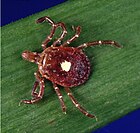Nuttalliella
| Nuttalliella Temporal range:
| |
|---|---|

| |
| Scientific classification | |
| Domain: | Eukaryota |
| Kingdom: | Animalia |
| Phylum: | Arthropoda |
| Subphylum: | Chelicerata |
| Class: | Arachnida |
| Order: | Ixodida |
| Family: | Nuttalliellidae Schulze, 1935 [2] |
| Genus: | Nuttalliella Bedford, 1931 [1] |
| Type species | |
| Nuttalliella namaqua Bedford, 1931
| |
| Fossil species | |
| |
Nuttalliella is genus of tick. It contains a single living species, Nuttalliella namaqua found in southern Africa, having been reported from Tanzania, Namibia and South Africa.[3] The genus is placed in its own family, Nuttalliellidae.[4] It can be distinguished from ixodid ticks and argasid ticks by a combination of characteristics including the position of the stigmata, lack of setae, strongly corrugated integument, and form of the fenestrated plates.[5] It is the most basal lineage of living ticks.[6]
History of research
[edit]The first description by G.A.H. Bedford in 1931 was based upon a single female collected under a stone at Kamieskroon, in Little Namaqualand, by Dr R.F. Lawrence in October 1930.[7] The genus and family were named for the bacteriologist George Nuttall, a specialist in diseases transmitted by ticks.[6] The species was recognised as distinctive enough to warrant its own family in two publications in 1935 and 1936.[8] As of 1980, only eighteen specimens had been collected.[6] In a 2011 study, that number was increased to fifty-one total specimens. They were collected in three locations in South Africa including two new sites: Springbok, Graaff-Reinet, and Heuningvleipan.[6]
In 2024, 5 fossil species of the genus were described from Burmese amber in Myanmar, dating to the mid-Cretaceous, around 100 million years ago. In this study, it was suggested that the extinct genera Deinocroton and Legionaris also known from Burmese amber should also be included in Nuttalliellidae.[8]
Distribution
[edit]Nuttalliella namaqua has been observed in Tanzania, Namibia and South Africa. Localities of collection include coastal (west and south) and inland sites (north). The Namibia specimens were collected from museum mammal skins in Kuboes. The biomes represented by these locations are: mixed tree and shrub savannah, Nama Karoo and Succulent Karoo.[6]
Behavior
[edit]N. namaqua is believed to be a generalist when choosing a host.[9] N. namaqua has been collected from mammals, reptiles and birds' nests.[6] Genetic sequencing of blood found in N. namaqua show a wide diversity of lizard hosts.[9]
References
[edit]- ^ G. A. H. Bedford (1931). "Nuttalliella namaqua, a new genus and species of tick". Parasitology. 23 (2): 230–232. doi:10.1017/S0031182000013573. S2CID 83785631.
- ^ Schulze-Rostock, P. (1935). "ZUR VERGLEICHENDEN ANATOMIE DER ZECKEN. (DAS STERNALE, DIE MUNDWERKZEUGE, ANALFURCHEN UND ANALBESCHILDERUNG, IHRE BEDEUTUNG, URSPR+£NGLICHKEIT UND LUXURIEREN)" [ON THE COMPARATIVE ANATOMY OF TICKS.]. Zeitschrift für Morphologie und Ökologie der Tiere (in German). 30 (1): 1–40. doi:10.1007/BF00418067. JSTOR 43261572. S2CID 28473817.
- ^ James E. Keirans; Carleton M. Clifford; Harry Hoogstraal; Emmett R. Easton (1976). "Discovery of Nuttalliella namaqua Bedford (Acarina: Ixodoidea: Nuttalliellidae) in Tanzania and redescription of the female based on scanning electron microcopy". Annals of the Entomological Society of America. 69 (5): 926–932. doi:10.1093/aesa/69.5.926.
- ^ Alberto A. Guglielmone; Richard G. Robbins; Dmitry A. Apanaskevich; Trevor N. Petney; Agustín Estrada-Peña; Ivan G. Horak; Renfu Shao; Stephen C. Barker (2010). "The Argasidae, Ixodidae and Nuttalliellidae (Acari: Ixodida) of the world: a list of valid species names" (PDF). Zootaxa. 2528: 1–28. doi:10.11646/zootaxa.2528.1.1. hdl:11336/97869.
- ^ Mohamed A. Roshdy; Harry Hoogstraal; Abdulelah A. Banaja; Samir M. El Shoura (1983). "Nuttalliella namaqua (Ixodoidea: Nuttalliellidae): spiracle structure and surface morphology". Parasitology Research. 69 (6): 817–821. doi:10.1007/BF00927431. S2CID 33872322.
- ^ a b c d e f Ben J. Mans; Daniel de Klerk; Ronel Pienaar & Abdalla A. Latif (2011). Oliveira, Pedro Lagerblad (ed.). "Nuttalliella namaqua: a living fossil and closest relative to the ancestral tick lineage: implications for the evolution of blood-feeding in ticks". PLoS ONE. 6 (8): e23675. Bibcode:2011PLoSO...623675M. doi:10.1371/journal.pone.0023675. PMC 3157464. PMID 21858204.
- ^ Bedford, G.A.H. (1931): "Nuttalliella namaqua, a new genus and species of tick". Parasitology 23 (2): 230-232. doi:10.1017/S0031182000013573
- ^ a b Chitimia-Dobler, Lidia; Handschuh, Stephan; Dunlop, Jason A.; Pienaar, Ronel; Mans, Ben J. (2024-04-16). "Nuttalliellidae in Burmese amber: implications for tick evolution". Parasitology: 1–17. doi:10.1017/S0031182024000477. ISSN 0031-1820.
- ^ a b Mans, Ben J.; de Klerk, Daniel G.; Pienaar, Ronel; Latif, Abdalla A. (2013-09-21). "The host preferences of Nuttalliella namaqua (Ixodoidea: Nuttalliellidae): a generalist approach to surviving multiple host-switches". Experimental and Applied Acarology. 62 (2): 233–240. doi:10.1007/s10493-013-9737-z. hdl:2263/33541. PMID 24057095. S2CID 17797303.

